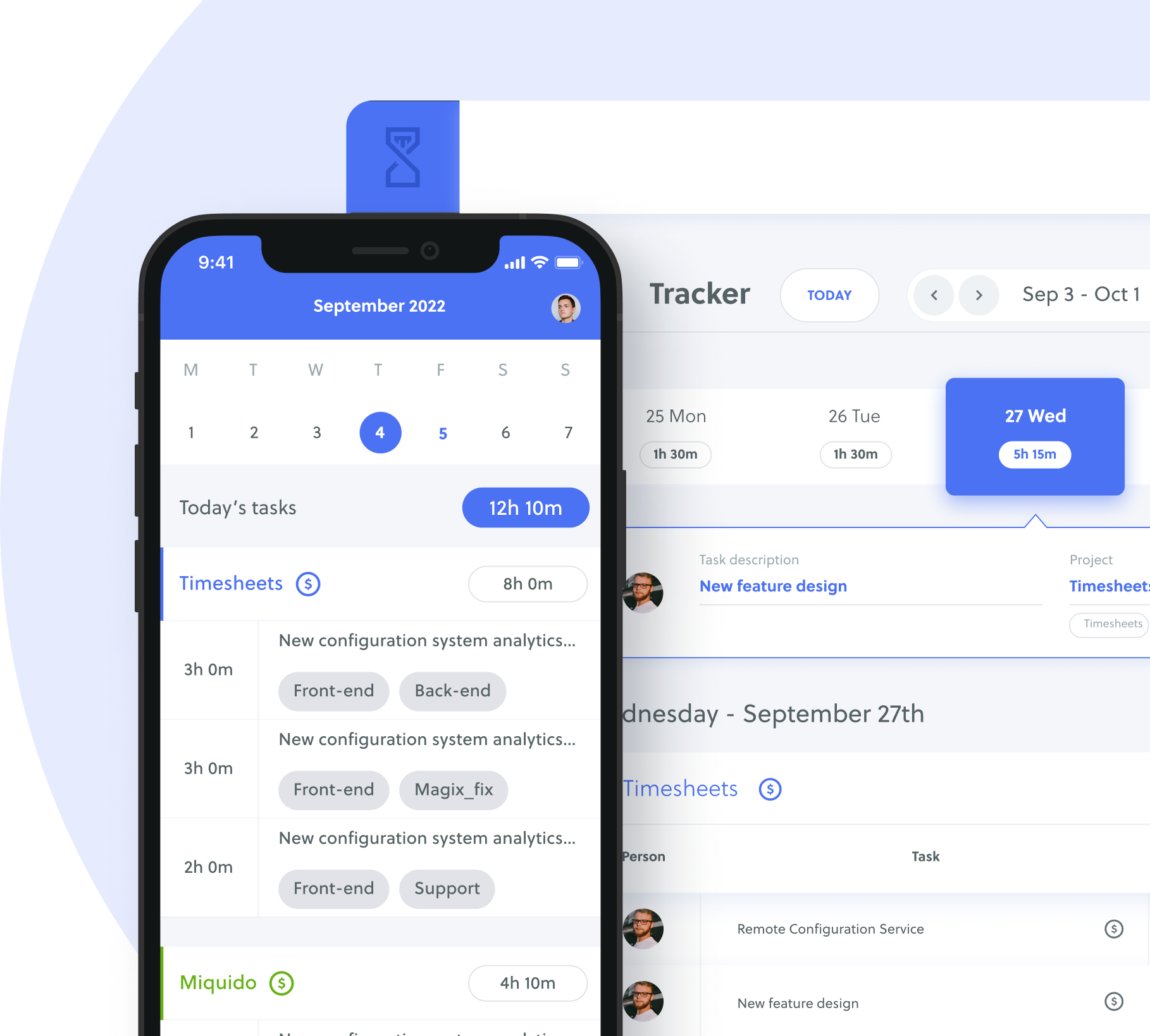If you feel like there are never enough hours in a day, this article is just right for you.
The fact that you’re facing that predicament means you’re probably falling victim to some common time management challenges. These challenges may lead to poor time management, and the effects will reflect on your entire life, from work and studies to health and relationships.
Identifying the time management challenges is the first critical step toward resolving the issue. Once you know these challenges, you can devise a strategy to overcome them and bring order to your life.
Keep reading to learn the ten common time management mistakes and how to beat them.
Table of Contents
Time Management Challenges
There are lots of time management challenges. However, this section covers the most common and problematic ones. Let’s get started.

1. Being Busy Instead of Effective
Are you familiar with the feeling that nothing substantial seems to get done despite being so busy? Unfortunately, this is one of the most common time management issues. It happens when you prioritize low-priority tasks or ones with the least impact in the grand scheme of things.
Such tasks will keep you busy, but at the end of the day, the impact of your work will be negligible at best.
Learning to prioritize tasks is key to effective time management. Have a prioritized to-do list for every week or day to know which jobs are your top priority tasks and which are the less important tasks.
Effective prioritizing means organizing your working hours so that the high-priority task is always scheduled to be done first and the less important ones–last. If you follow your list from high-priority to low-priority, you will avoid spending too much time on easy tasks that don’t move the needle.
We recommend following time management techniques like Stephen Covey’s time management matrix to prioritize tasks.
2. Avoiding Automation
Another common time management mistake most people make is avoiding automation. This leaves you spending endless hours on repetitive tasks. That’s hours you could spend on other, more important tasks if you let technology handle the mundane ones.
Here are example tasks you can start automating today.
Social media posts. Online tools like Hootsuite can help you with writing engaging posts. Then you can set a weekly schedule to publish them automatically.
Invoicing. There’s so much you can have automated in this field, from setting up unpaid invoice reminders to having a program fill in most of your paperwork.
Email conversations. Setting up email signatures, autoresponders, and out-of-office messages will ensure you spend fewer hours running your email campaigns.
Writing. Use online tools like Grammarly to edit and proofread your assignments, blog articles, and other kinds of publications and documents your company sends out.
Marketing. Modern businesses use automation in their everyday marketing strategy – from automated email drip campaigns and lead generation to automated ecommerce product recommendations and marketing reports.
Live chat. Adding a live chat to your website is necessary for modern businesses. The automation tool makes it quick and easy for customers to reach your brand. You can also generate sales using the tools. This saves you time and money.
The above list shows just a few examples of tasks that can be automated. Depending on your industry and business model, there may be many more everyday processes that you can automate to enhance your productivity.
3. Not Managing Distractions
Distractions are a time management problem we’re all familiar with. Distractions are all too common, whether it’s your phone buzzing with notifications, your pet running into your home office, or a colleague showing you a silly TikTok at the office.
On average, a person is interrupted 50-60 times a day. The same report from Harvard Business Review reveals that 80% of those interruptions are unimportant things.

To boost your time management and productivity, you must practice deep work techniques and eliminate distractions as much as possible.
How do you achieve that? You can start by eliminating the obvious distractions. For example, put your phone on silent or in focus mode every time you’re working. You can also use focus apps to block distractions.
Secondly, prepare a to-do list in advance and prioritize the tasks correctly. This ensures that your days are well planned; hence you won’t be jumping from random tasks that could easily distract your focus.
It’s also important to set predetermined breaks. This will be instrumental in keeping you feeling fresh, which enhances your productivity and reduces your susceptibility to distractions.
Finally, do a serious audit of your working space. Look out for any items that distract your attention and get rid of them. You can also redesign your workspace to make it more comfortable and inviting for you to work in.
4. Procrastinating
Procrastination happens when you put off a task for as long as you can. It’s a psychological reaction to something the human brain considers challenging.
For instance, going through your junk emails instead of calling an important client. That’s procrastinating. Although you know you have to make that call, you put it off until the last minute.
There may be many reasons why you choose to procrastinate. You may think the task is difficult, boring, stressful, or involves difficult decision-making. Often, just thinking about the task is stressing you out.
Admittedly, beating procrastination can be challenging. However, it’s not impossible. You can start by confronting yourself. Why do you procrastinate? Is it because the task feels overwhelming? If so, consider breaking it down into smaller management subtasks.
Is it because the action requires a difficult decision? Well, think about the consequences of inaction.
Setting specific timelines and deadlines for each task will also help beat procrastination.
Remember that procrastinating is a state of mind, so if you admit that you tend to do it, it’ll be easier to act to beat it.
5. Being a Perfectionist
Being a perfectionist is a great thing. Perfectionists show excellent engagement and motivational skills. They always aim toward the highest quality. But it can also cause issues. This may especially happen if your to-do list is loaded. Trying to achieve perfection may come at the cost of your productivity.
Learning when to loosen can help you overcome this time management challenge. But, of course, you mustn’t let go of everything you do. Instead, you need to find a balance where every task gets done correctly without wasting too much time chasing perfection.
6. Doing Everything On Your Own
Having too much on your plate can lead to poor time management decisions. Bad estimation of the resources and the time you have available can lead to overextending. After all, we only have 24 hours in a day and limited energy.
There are a few ways to avoid this. One is that you only accept projects that you’re completely sure you’ll be able to complete successfully. Now, this may not work for everyone, especially if you have a boss over you.
Another solution is to delegate some tasks to others. To decide what sort of tasks you can delegate to other people, try one of the time management techniques, like Eisenhower’s Priority Matrix.
According to that time-management framework, you label all your tasks as either Urgent or Not Urgent and either Important or Not Important. Then, draw a four-box square, like the one below, and group the tasks from your to-do list into one of the four boxes.

As you can see from the matrix, the tasks that are urgent but not important should be delegated.
One more solution to the problem of doing everything on your own is to outsource. If you’re a business owner, consider outsourcing some of your routine tasks.
For example, if you regularly update your website or blog—have a virtual assistant or a freelance copywriter do these for you. Or, if accounting tasks take a lot of your time, use an accounting agency to do them for you.
Compare the outsourcing costs and decide if it’s worth freeing up your time and energy so that you can focus on more critical activities instead. Like, finding opportunities to take your business to the next level.
7. Lack of Energy
Not having enough energy to get you through the day may have severe consequences on your time management and productivity. This includes not being able to produce high-quality work. Not to mention the health-related problems.
A consistent sleep schedule and a healthy diet are very important to stay alert during the day. Go to bed a little earlier to start the next day with a few exercises and a healthy breakfast. It’s recommended that an adult person should sleep for eight hours a day. Also, you should ditch bad habits like missing lunch!
Finding the right routine for you will also improve your productivity and health. Your work quality will improve, and you’ll be able to complete tasks faster and thus achieve your goals for each day.
And don’t forget to take breaks as required and stick to the schedule. That brings us to the next time management mistake.
8. Skipping Breaks
Skipping breaks leads to poor time management and a lack of concentration. Your energy will run out, and so will your overall performance and productivity.
So, whether you’re in between important tasks or some minor tasks, give your body a moment to relax. Make sure to schedule breaks into your workday. You can use handy tools like Google Calendar, set alerts on your smartphone, or a time tracker app to remind yourself of your break schedule.
Another way to ensure you aren’t working too long is using the Pomodoro time management technique.

You’ll need a timer and your to-do list to use this tactic.
Set your timer for 25 minutes and focus on one task till the timer ends. In this technique, one 25-minute session is called a Pomodoro. Then, record what you completed and take a five. After repeating this four times, take a longer break (15-30 minutes).
Projects that take more than four Pomodoros should be broken into smaller, more achievable tasks. On the other hand, minor jobs that will take less than one Pomodoro should be grouped.
Implementing the above task management technique will ensure you give your brain regular breaks. Making it a habit will improve your time management skills and help you overcome similar challenges. In addition, you can install Pomodoro apps to help you use this technique effectively.
9. Not Thinking About Tomorrow
If you want to create exceptional results in your professional and personal life, you have to have a vision. To make your vision a reality, you need to master strategic thinking and set short-term goals within a set time frame.
Thinking about the next day, month, and year will sketch out plans for your vision. Once you get to a point where you have a more detailed vision of your goals, the next step is to prepare yourself. Think of what you have to do to achieve your goal.
For example, if your goal is to design websites, you’ll have to learn how to code. How will you learn that? You can take a course. How will you get the money to pay for the course? You can get a weekend job to earn extra cash.
Setting SMART goals is a well-known business strategy that can help you set goals you want and can achieve. According to this method, your SMART goals should be:
Specific – describe your goal and provide a clear description of what you want to accomplish
Measurable – your goal needs to be measurable. Find a metric or figure that will help you assess when your goal has been achieved.
Attainable – your goal has to be achievable; consider the time limit and the resources you have
Relevant – does your goal align with your corporate priorities? If so, consider it SMART.
Time-Bound – set a deadline for the goal, so you know your limitations
If your goal is SMART, there’s a better chance you will stay focused and motivated to achieve your goal.
You should develop awareness and adaptability skills to overcome possible problems you’re likely to encounter on the way. So, you should keep asking yourself how today’s tasks will impact next week’s activities. This way, it’ll be easier to adapt your plans to the changing circumstances.
Planning will also help you to stay motivated, as every project’s little task will get you closer to the ultimate goal. Seeing what’s coming will keep you motivated.
10. Not Reviewing Time Management Regularly
If you want to check if your time management skills have improved, you need regular reviews of your performance. Spend the last five minutes of each day for a performance review. You can also evaluate your time management technique and skills weekly.
Weekly reviews will help you learn that things don’t always work out as planned. So, if you find that the time you allocated for one particular task was not enough, you’ll make a better judgment for similar tasks in the future.
The best time-tracking apps will also generate insightful reports showing your productivity trends. Look into your monthly and half-year reports to get a birds-eye view of how you manage time.
If your chosen strategy is not working, implement changes to make the system work better for you. Or, try a different one. Either way, you must regularly review your time management trends and make the necessary adjustments to improve your productivity.
Overcome Your Time Management Challenges
Now you understand the common time management challenges and the steps you can take for better time management.
Once again, the time management mistakes include keeping yourself busy instead of effective, procrastinating, chasing perfection, entertaining distractions, skipping breaks, failing to plan ahead, and avoiding automation.
Moreover, failing to evaluate your time management efforts regularly makes it impossible to know whether your tactics are working.
To master time management, you should learn how to manage distractions, prioritize important and urgent tasks, and stop being a perfectionist in everything you do. In addition, staying healthy and avoiding bad habits such as skipping breaks will help you have enough energy to get you through the day.
So, are you ready to take your productivity to the next level? It’s time to be conscious of the challenges highlighted above and put the tips we’ve discussed into action.







